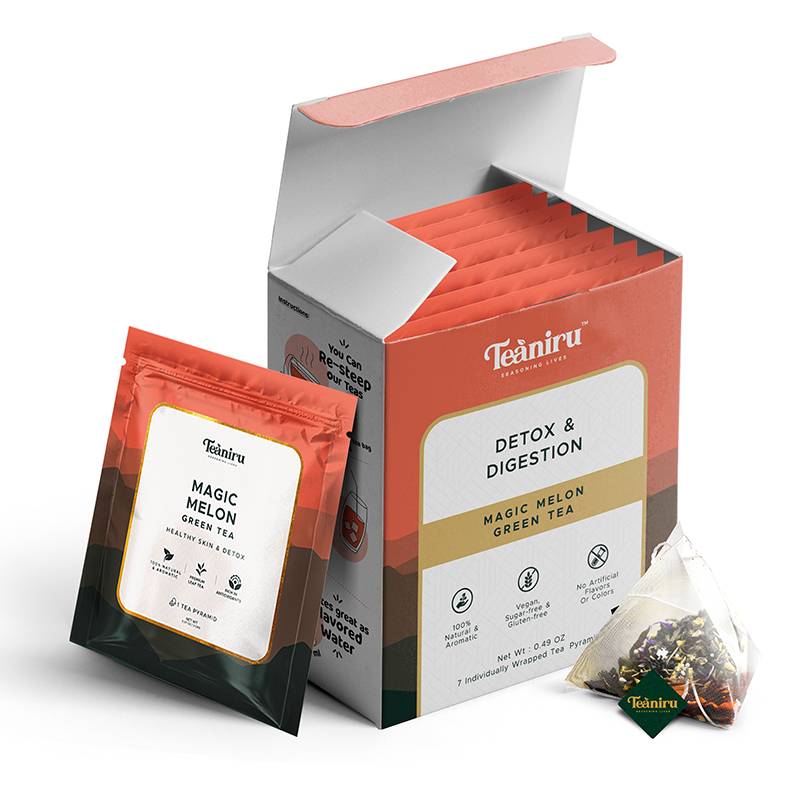You may also like
We've all heard the phrase, "You are what you eat," and it turns out there's more truth to it than we might realize. The foods and beverages we consume can play a significant role in our overall health and well-being. Recent research has hinted at a potential link between excessive dietary acidity and a host of health problems, including inflammation, heart disease, obesity, diabetes, and chronic pain.
But before you rush to eliminate all things acidic from your diet, there's a vital piece of the puzzle to consider: pH levels. Understanding the concept of pH and learning which foods lean towards acidity and which lean towards alkalinity can be a game-changer in your quest for a healthier lifestyle. In this blog, we'll delve into the world of dietary acidity, pH levels of green tea.
Table of Contents
1. How much acidity is too much?
2. Green tea: Acidic or Alkaline?
3. Does the taste of green tea indicate its acidity?
4. Can green tea cause acidity in the stomach?
5. Can green tea help with digestive issues?
6. Is green tea a good option for individuals with Heartburn or GERD?
7. Can green tea be acidic if it is brewed for too long?
8. How to assess the quality of green tea when it comes to acid levels?
How much acidity is too much?
In terms of the human body, acidity is typically measured using the pH scale, which ranges from 0 to 14. A pH value below 7 is considered acidic, a pH of 7 is considered neutral, and a pH above 7 is considered alkaline or basic.
|
Tea Types
|
Approximate pH Level
|
|
Black tea
|
4.9-5.5
|
|
7-10
|
|
|
Herbal tea
|
Varies (depends on the herbs used)
|
|
Oolong tea
|
6-7.5
|
|
White tea
|
6-7.5
|
|
Yellow tea
|
6 to 7
|
The pH level of all the tea varieties.
Green tea: Acidic or Alkaline?
Green tea is generally considered to be slightly alkaline or neutral in terms of its pH level. The pH of green tea typically ranges from 7 to 9, which falls within the range of neutrality or slight alkalinity. This means that, on the pH scale, green tea is not considered to be acidic.
The pH of green tea is determined by analyzing its chemical composition and measuring the concentration of hydrogen ions present in the tea.
Does the taste of green tea indicate its acidity?
The taste perception of green tea can vary among individuals. Some may describe it as having a mildly astringent or slightly acidic taste. However, it's important to note that taste perception does not necessarily reflect the actual pH level of the tea. Other factors, such as the presence of natural compounds like catechins, can contribute to the taste experience.
Can green tea cause acidity in the stomach?
Green tea is not known to cause acidity in the stomach. In fact, the stomach naturally has a highly acidic environment, with a pH ranging from 1 to 3. This acidity is necessary for the digestion of food. While green tea itself is not highly acidic, it's possible that individual reactions to certain components in green tea, such as caffeine, may vary. Some individuals with sensitive stomach or underlying digestive conditions may experience discomfort after consuming green tea, but this is not directly related to increased stomach acidity.
Can green tea help with digestive issues?
Green tea contains antioxidants, such as catechins and EGCG, which have been studied for their potential health benefits, including reducing inflammation in the body. Inflammation can contribute to various digestive issues. By reducing inflammation, green tea actually helps alleviate certain digestive discomforts rather than increase acid levels. However, individual sensitivities and pre-existing conditions should be taken into consideration, and it's always advisable to consult with a healthcare professional for personalized advice.
Is green tea a good option for individuals with Heartburn or GERD?
Green tea is generally well-tolerated and does not commonly cause heartburn. Green tea can be a good option if you prepare and consume it properly.
How to prepare and consume green tea for individuals with heartburn and GERD?
Brewing green tea at a lower temperature and for a shorter duration can reduce the extraction of certain compounds that may contribute to acidity. Additionally, consuming green tea in moderation and with food may help minimize any potential discomfort.
However, individuals with a history of heartburn or gastroesophageal reflux disease (GERD) may experience discomfort if they are particularly sensitive to certain components in green tea, such as caffeine.
Can green tea be acidic if it is brewed for too long?
When green tea is brewed for an extended period, it can release more tannins, which may contribute to a slightly more astringent or bitter taste. However, this does not necessarily indicate increased acidity. The pH level of green tea is primarily determined by its chemical composition, and brewing time alone is unlikely to significantly alter its overall acidity or alkalinity.
How to assess the quality of green tea when it comes to acid levels?
Assessing the exact acid levels of green tea requires specialized equipment and laboratory testing. It is not possible to determine the acid levels of green tea through simple observation or taste. To obtain accurate information about the acid levels, it is recommended to consult scientific studies or rely on lab analysis conducted by experts in the field.
But to find a good green tea, just look out these steps:
- Choose reputable brands and teas from well-known regions.
- Look for vibrant and uniform colors in the tea leaves.
- Seek a fresh and pleasant aroma.
- Prefer a smooth, mellow, and slightly sweet taste.
- Follow proper brewing techniques for best results.
- Consider organic or pesticide-free options for purity.
The Bottom Line
While green tea is often perceived as slightly acidic, it is important to note that the overall pH level can vary based on multiple factors, including the specific tea variety, brewing method, and individual body chemistry. However, it is worth noting that the pH level of green tea is generally considered to be lower compared to highly acidic beverages like citrus juices.
Ultimately, the impact of green tea on acidity levels in the body may vary from person to person, and it is recommended to consult with a healthcare professional for personalized advice. Regardless of its acidity, green tea offers numerous health benefits and a delightful tea-drinking experience that can be enjoyed in moderation.















